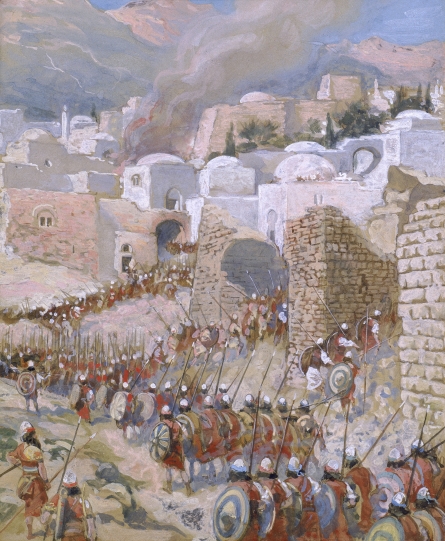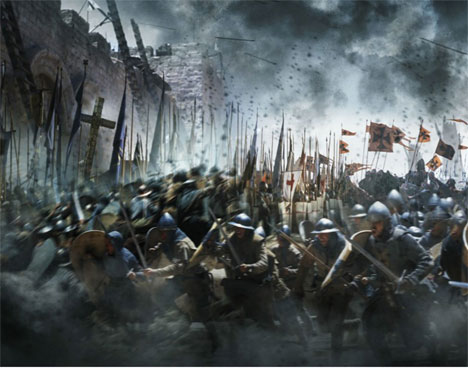Jul
25
2014

In a Land from which Cainites were being dispossessed, Israel herself would not only judge between the manslayer and the avenger of blood, but provide cities of refuge to the “firstborn” Levites as a gift.
The Avenger of Blood
Like Adam, Cain would not “bear” his sin. But unlike Adam, Cain was rejecting the covering of animal substitutes. As the “offspring” of the serpent (kinghood without priesthood), he only understood law as tyranny. There was no place for mercy (Atonement) because mercy required Covenant confession.
Continue reading
Comments Off | tags: Abel, Cain, Genesis, High Priest, Levites, Numbers | posted in Biblical Theology
Mar
19
2014

And I looked, and behold, a black horse! And its rider had a pair of scales in his hand. (Revelation 6:5)
The book of Revelation is a mystery, yet like all good mysteries it is a book made entirely of clues. It is a glimpse through the torn veil of the Temple, that is, the flesh of Jesus, into the heavenlies. The cloud into which He was taken up is opened to John’s eyes that he might see the horses and chariots of God (2 Kings 6:17). But John is a prophet who knows the Bible, and like John we will only understand the symbols if we know the Bible. The conversation at God’s table is for those who know their Master’s mind, who hear His voice as children and thus quit themselves like men. To them, this is indeed a Revelation. To those outside His commission, it remains an enigma, terrible lightning and thunder and the sound of trumpets (Exodus 19:19; 20:18).
This post has been slain and resurrected for inclusion in my 2015 book of essays, Inquietude.
Continue reading
Comments Off | tags: Daniel, Exodus, James B. Jordan, Numbers, Revelation, Tabernacle | posted in Bible Matrix, Biblical Theology
Mar
10
2014

For as in those days before the flood they were eating and drinking, marrying and giving in marriage, until the day when Noah entered the ark, and they were unaware until the flood came and swept them all away, so will be the coming of the Son of Man. (Matthew 24:38-39)
Most disputes concerning the meaning of the Scriptures are not due to a lack of trying when it comes to hermeneutics. They result from a lack of due process. By this, I do not mean the process of interpretation but the identification in the Scriptures of the processes of God.
An example would be the meaning of Christ’s words concerning the unpardonable sin, which have terrified many Christians unnecessarily. Blasphemy against the Spirit is unpardonable not because it is the worst sin. It is unpardonable because it is the last sin.
This post has been slain and resurrected for inclusion in my 2015 book of essays, Inquietude.
Continue reading
2 comments | tags: AD70, Babylon, Covenant Theology, Genesis, Hebrews, Herod, Matthew, Matthew 24, Nebuchadnezzar, Noah, Numbers | posted in Bible Matrix, Biblical Theology, Christian Life, The Last Days
Jan
16
2014
or Baptism into Baal

Then you shall say to Pharaoh,
‘Thus says the Lord,
Israel is my firstborn son,
and I say to you,
“Let my son go that he may serve me.”
If you refuse to let him go,
behold,
I will kill your firstborn son.’”
(Exodus 4:22)
My Federal Vision friends believe baptism is an important subject, from both theological and pastoral points of view. I agree, but for me it is also an issue of aesthetics. The Bible has a wonderfully consistent internal logic, and paedobaptism crunches the gears at every turn.
Peter Leithart just posted something concerning baptism, and it’s worth answering, not only “because somebody on the internet is wrong,” but also because it is an issue I’ve just finished dealing with in The Shape of Galatians. It should be noted that Trinity House is hosting some lectures on sacraments by a baptist, so Dr Leithart and his colleagues have a spirit that should be imitated by theologians everywhere. My own posts here are always bait in the hope of a bite, a friendly disputatio, so don’t take them the wrong way. If a friend has soup on his tie, or wax in his ear, or a fertility rite in his sacrament, what sort of friend isn’t going to point it out!?
Continue reading
4 comments | tags: Abel, Abraham, Baptism, Cain, Federal Vision, Galatians, Genesis, Numbers, Paul, Peter Leithart, Romans, The Shape of Galatians | posted in Bible Matrix, Biblical Theology, Quotes
Dec
20
2013

God loves His architecture. The first chapter of the Bible is architecture. The books of Moses and the book of Revelation are filled with architecture, and the same floorplan underlies every book in between. Most Christians don’t understand the Bible’s architecture and modern Christians not only do not understand it, they do not care for it. But God loves His architecture. To love the Bible one must love its architecture. To understand the Bible, one must let the architecture inform one’s understanding.
Continue reading
Comments Off | tags: Abel, Baptism, Cain, Circumcision, Covenant curse, Covenant Theology, Genesis, High Priest, Numbers, Peter Leithart | posted in Biblical Theology, Quotes
Oct
24
2013

“Once the architecture is taken into account, the text is not ridiculous but terrifying. It marches inexorably through the deep rhythm of the seven days with laser precision, stately deliberation, and omniscient vision. These words were breathed by the source of all breath.”
Part I – Picking Up Sticks
“You shall kindle no fire in all your dwelling places on the Sabbath day.” (Exodus 35:3)
Many Christians ignore, and atheists poke fun at, the weird bits of the Bible, as though these texts are primitive, distorted, or contrived. Nothing could be further from the truth. The truth is that these texts are designed to choke the faithless, and to be chewed over, meditated upon by the faithful, that we might be changed.
Why was fire forbidden on the Sabbath? The first thing to do with any text is identify its context. No more treating Bible texts like fortune cookies, do you hear me?
Continue reading
Comments Off | tags: Booths, Covenant curse, Covenant Theology, Exodus, Feasts, Literary Structure, Moses, Numbers, Tabernacle | posted in Bible Matrix, Biblical Theology
Aug
10
2013

Paul’s Numbers
We have arrived at what appears to be the center of the epistle, which would be Testing (in matrix terms), the “opening” of the Law (Ethics 2 in Covenant terms) and “purification” (in sacrificial terms). And, being at the centre of the book, this part is the Apostle’s main argument, or thesis. Just as Christ and the coming of the kingdom in His sending of the Spirit are found at the centre of Covenant history, so the transformation by fire of the Levitical priesthood into a fragrant Bride are at the centre of Galatians.
Continue reading
Comments Off | tags: Baptism, Galatians, Numbers, Paul, Ray Sutton | posted in Bible Matrix, Biblical Theology
Jul
3
2013
 James B. Jordan was the first Bible teacher I ever heard who had an opinion on the gift of tongues in relation to the rest of the Bible. This gent cops a lot of criticism from the establishment for various things, but he is one who really “gets” the Bible. This is because he asks the right questions. And, without being too harsh, he most often makes all the other theologians and Bible teachers in any debate, on both sides of the debate, look like kindergarten children.
James B. Jordan was the first Bible teacher I ever heard who had an opinion on the gift of tongues in relation to the rest of the Bible. This gent cops a lot of criticism from the establishment for various things, but he is one who really “gets” the Bible. This is because he asks the right questions. And, without being too harsh, he most often makes all the other theologians and Bible teachers in any debate, on both sides of the debate, look like kindergarten children.
Continue reading
1 comment | tags: AD70, Babylon, Corinthians, Luke Welch, Numbers, Systematic typology, Tongues, Trumpets | posted in Biblical Theology, Quotes, The Last Days
Jun
27
2013

So I find it to be a law that when I want to do right, evil lies close at hand. For I delight in the law of God, in my inner being, but I see in my members another law waging war against the law of my mind and making me captive to the law of sin that dwells in my members. (Romans 7:21-23)
Interpreters debate the meaning of Paul’s words in Romans 7:14-25. Are we to apply these statements to a Christian or a non-Christian? Could a Christian utter these words? Perhaps a better question is, are these the words of an unregenerate man?
Continue reading
Comments Off | tags: Numbers, Paul, Romans | posted in Biblical Theology, Christian Life, Ethics, The Last Days
Feb
18
2013
 or What Was A Nazirite?
or What Was A Nazirite?
“A defiled Nazirite is an Adam or an Eve who has failed at holy war and thus cannot enter into God’s rest.”
Since I rave on about structure so much (and how wrong it is that we moderns regard it as merely an ornamental option rather than as the label on the tin) the fractalicious* Covenant structure of Numbers 6 should give us some clues as to what the Nazirite vow actually was in the big picture.
Continue reading
2 comments | tags: Baptism, Literary Structure, Nazirite, Numbers, Numbers 6 | posted in Bible Matrix, Biblical Theology, The Last Days



































